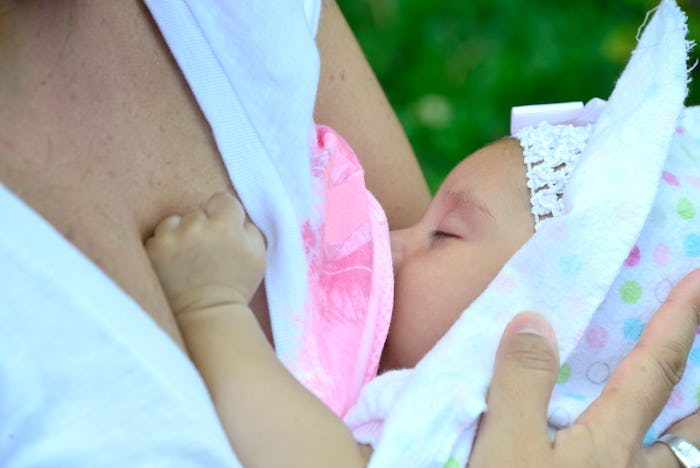Life

How Breast Milk Protects Babies From Infections, According To Science
Breast milk has long been hailed as nature's magical concoction for growing babies. It is jam-packed with essential vitamins, nutrients, and antibodies to help little ones grow and develop into strong and healthy kids. Adding to these incredible health advantages, science has recently pinpointed another benefit of breastfeeding: Breast milk also helps protect babies from bacterial infections, as new research suggests.
Mother's milk consists of a complex and continually changing mix of proteins, fats and sugars that works together to protect babies from dangerous bacteria, according to the American Pregnancy Association. And previous research surrounding the antibacterial powers of breast milk focused on its protein makeup. However, researchers at Vanderbilt University found that certain sugars found in human milk not only fight bacterial infections on their own, but also amplify the power of antibacterial proteins. Assistant Professor of Chemistry Steven Townsend, director of this study, stated in a press release:
This is the first example of generalized, antimicrobial activity on the part of the carbohydrates in human milk. One of the remarkable properties of these compounds is that they are clearly non-toxic, unlike most antibiotics.
The study's findings were presented at the annual meeting of the American Chemical Society in Washington D.C. on Aug. 20. The researchers were reportedly inspired to embark on this study by the growing bacterial resistance to antibiotics. In fact, the Centers for Disease Control estimates that 23,000 deaths are caused by this type of resistance each year.
Townsend said in the press release that the researchers were looking for a means to combat this issue, starting with a common bacteria:
We started to look for different methods to defeat infectious bacteria. For inspiration, we turned to one particular bacteria, Group B Strep. We wondered whether its common host, pregnant women, produces compounds that can either weaken or kill strep, which is a leading cause of infections in newborns worldwide.
Rather than follow in the footsteps of earlier researchers who focused on the powerful proteins, Townsend and his colleagues were interested in the sugars found in breastmilk that have proven difficult to study:
For most of the last century, biochemists have argued that proteins are most important and sugars are an afterthought. Most people have bought into that argument, even though there's no data to support it. Far less is known about the function of sugars and, as a trained glycoprotein chemist, I wanted to explore their role.
Breastmilk sugars have what Townsend called a "one-two punch" when it comes to fighting bacteria:
First, they sensitize the target bacteria and then they kill them. Biologist sometimes call this "synthetic lethality" and there is a major push to develop new antimicrobial drugs with this capability.
This exciting new research provides more insight into the power of breast milk as well as potential implications for medicinal antibiotic development in the face of growing drug resistant bacteria. While breastfeeding is not an option for all moms, we all benefit from added information on the science behind growing babies.